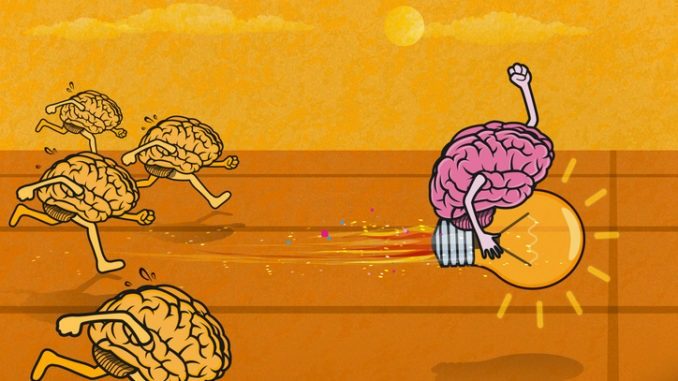
What are the different types of knowledge that are needed to become a great leader?
CREDIT: This is an edited version of an article that originally appeared on Ambition Institute
Leaders spend a lot of time in meetings, often to mixed reviews. Some are informative and interesting, where genuinely useful conclusions are reached – perhaps even with a flourish of insight or inspiration. Others can be dour affairs with little achieved, where people have one eye on the clock and are making calculations about what they could meaningfully be doing with their time instead.
Chairing a meeting is something that people in many different roles or professions do and, therefore, it is often seen as a generic leadership skill which is transferable and important for leaders to learn as part of leadership development. At a surface level, there are undoubtedly things we can observe that are transferable across different professions or settings; a good chair is important – all of us will be able to point to meetings that are more successful because of the person running it.
In a chapter from the upcoming book ‘The ResearchED Guide to Leadership’, we argue that what can often appear, on the surface, as a general leadership skill, in fact rests on a much deeper body of knowledge drawn from the domain and context in which we work. In order to become expert at something like chairing a meeting, it is important to look beyond the surface level features of the generic or composite skill, and to break it down into constituent or component parts.
Expert mental models
In our two chapters we explore the idea of ‘expert mental models’ – the knowledge that is held by an individual and the way it is organised to guide action. We argue that expertise is mainly a matter of knowledge. If we want school leaders to become more expert, then it follows that we need to understand more about what leaders need to know, and how we can help them to learn this.
In their 1993 book ‘Surpassing Ourselves’, Bereiter and Scardamalia emphasise the importance of knowledge and the reluctance that it be accepted as integral to the work of experts. “Most people we talk to do not want to believe that research shows expert performance is mainly a matter of knowledge. They do not necessarily have an alternative explanation ready, but they feel there has to be more to expertise that that.” (Bereiter and Scardamalia, 1993).
Formal knowledge
One category of knowledge school leaders rely on is formal knowledge – the type of knowledge that can be explicitly stated, codified and written into books or documents. In our original example of chairing a meeting, this could include transferable knowledge – such as knowing how to form agendas, leading individuals to contribute papers, oversight of the logistics of paper circulation and ensuring minutes are appropriately recorded, checked and distributed.
But this transferable or generic knowledge is just a small proportion of what a chair needs to know in order to manage a meeting well. In comparison, specific knowledge of the subject or domain of the meeting itself will have a greater bearing on their ability to chair the meeting. Specialist or ‘domain-specific’ knowledge is essential, but it can often be overlooked in leadership development which, too often, focuses on what is generic and is, therefore, often disconnected from the specific field or task (Robinson, 2006).
Even this wider view of formal knowledge – acknowledging both the generic and domain-specific – is only part of the puzzle. Formal, ‘textbook’ knowledge is often what people think about when they think of knowledge; indeed, the traditional caricature of schools filling children’s empty minds with various sets of disconnected facts rests on this view of formal knowledge.
Bereiter and Scardamalia argue that formal knowledge represents just one of four categories of knowledge that ‘must be recognised if one is to understand expertise in a productive way’ (Bereiter and Scardamalia, 1993, p.47). The following three categories of knowledge are proposed as the ‘hidden knowledge of experts’:
- Informal knowledge.
- Impressionistic knowledge.
- Self-regulatory knowledge.
Informal knowledge
Informal knowledge can be thought of as ‘expert common sense’ – the type of knowledge that those with high levels of expertise often take for granted, and may find hard to identify or explain. Teaching itself relies on a great deal of informal knowledge – which requires practice and experience to acquire. Gaining formal knowledge through, for example, listening to podcasts, or reading books alone, is insufficient to become a more expert teacher.
Informal knowledge is extremely difficult to codify, or describe in words. A good example of where informal knowledge has been codified in the teaching world is Doug Lemov’s Teach Like a Champion. Lemov presents a series of techniques that capture, in written and visual form, what many experienced teachers do all of the time. Expert teachers would have found it very difficult to state exactly what they did to ensure high standards of behaviour, or how it is that they make sure it is pupils, and not themselves, doing the hard work in the classroom.
In our example of chairing meetings, an expert chair may have informal knowledge, built up through experience, which enables them to know when to close down or open up discussion points in a way that is hard to explain or teach, or how to subtly signal an action or decision to a notetaker. They may also know the nuances and common misconceptions of the domain through their experience, and so are able to challenge and avoid the outcome of the meeting resulting in poor decisions.
Informal knowledge is shaped by formal knowledge, and a secure foundation of formal knowledge is necessary to underpin the development of expertise. The development of informal knowledge requires both formal knowledge and experience so, whilst all experts are experienced, not all experience leads to expertise.
Impressionistic knowledge
Bereiter and Scardamalia describe impressionistic knowledge as the feelings associated with knowledge that allow us to form opinions or impressions of people and things. Impressionistic knowledge may not be always be relevant but, in some situations, will be essential. Consider, for example, a situation in which a teacher requests a leave of term-time absence. Deciding whether to agree to this, and how many days to allow, for example, relies upon a huge range of factors; how much time the person has asked for, what the reason is, what impact the absence will have on the department within which they work, and so on. These are impressions of need, merit, difficulty and cost. Of course, there is likely to be a policy which a leader can use to simplify the situation but, in reality, this can be superseded by leaders’ impressions of the situation and the individuals involved.
In a meeting situation, an expert chair will have a well-honed sense of how constructive different contributions and discussions are. They are also likely to predict how others will respond to different discussion points, and navigate these skilfully.
Self-regulatory knowledge
Bereiter and Scardamalia write that self-regulatory knowledge is ‘not knowing how to do the job but knowing how to manage yourself to do the job that way’ (p. 49). It is not necessarily knowledge of a domain, although it can be, but knowledge that is relevant to performance in the domain in question.
Self-regulatory knowledge can ‘be thought of as knowledge that controls the application of other knowledge’ (p.60); it is metacognitive in nature. Therefore, high levels of self-regulatory knowledge are reliant on knowledge of the domain in which the individual works. A school leader who is calm under pressure in school is not necessarily calm in all environments if they lack the knowledge that guides their action.
However, self-regulatory knowledge is the most transferable of all categories of knowledge, including habits like planning, practising and checking that are useful in any number of situations. Key to self-regulatory strategy, though, is that it is applied at the right time, in the right way – and to do so requires knowledge of the domain.
In a meeting scenario, a skilled chair will draw on self-regulatory knowledge to manage their own attention and emotions; this is likely to have been developed through substantial practice, reflection and feedback. They may also, based on their impressionistic knowledge, have spent time before the meeting ensuring that people understand key issues, or have had the time to express any strong feelings, in order to avoid these issues from derailing the meeting when it takes place.
Developing expertise in school leadership
It’s true that non-experts also possess these kinds of knowledge. The difference, Bereiter and Scardamalia argue, ‘is in how much they have, how well integrated it is, and how effectively it is geared to performance’.
Hyle et al write that ‘the development of expertise is dependent on [formal] knowledge provided by most preparation programmes and on hidden expert knowledge obtained through experience and self-reflection’ (p.173).
Professional development for school leaders must, therefore, involve access to rich sources of formal knowledge, and significant amounts of experience of the work, in order to make sense of formal knowledge and create opportunities to put into practice what they have learnt; ideally, leaders will also receive regular expert feedback about their work.
Codifying leadership knowledge
Central to developing school leaders’ expertise is understanding exactly what knowledge they need in order to carry out their work – what we might call ‘a taxonomy of leader knowledge’. By identifying, and codifying, this taxonomy of educational knowledge, we can give leaders a starting point from which to better understand their work and continue their development; it can also offer a shared language for leaders, and those responsible for their development, to communicate with and to enter into debate.
Of course, there is more to expertise than knowledge. Motivation, a desire for excellence and, to some extent, innate talents, all enable the development of expertise – but we think it is important to argue the primacy of knowledge for two reasons. Firstly, because knowledge is broader than we might first realise; it encompasses what we know, believe and understand about every aspect of our lives.
Secondly, because we want to dispel the myth that expert knowledge is in any way mysterious or unobtainable. This is an exciting and empowering realisation because it means that, given the right conditions, progress towards expertise is a possibility for all of us.





Be the first to comment